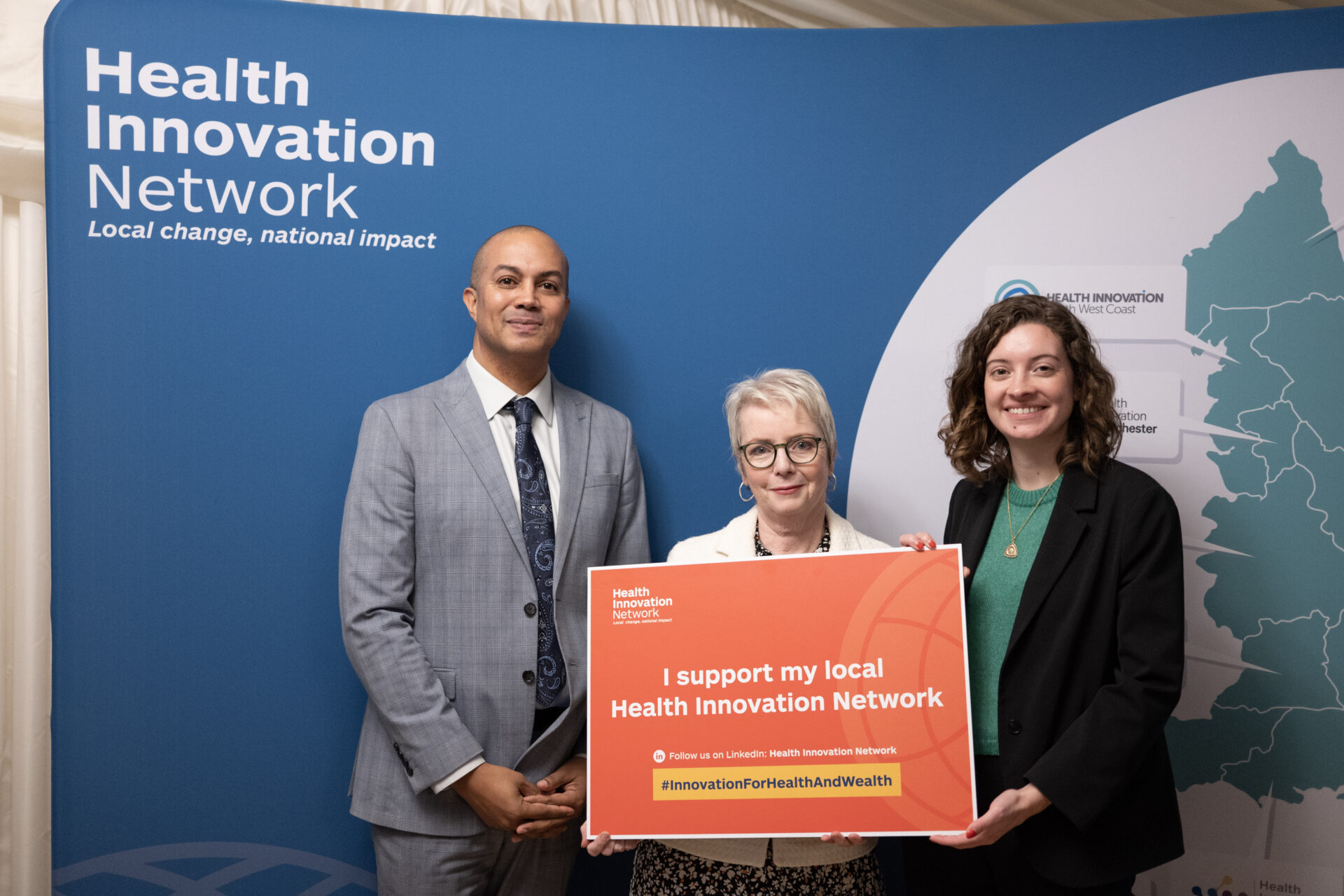Across England, innovation is improving cancer services and patient outcomes. Last week the government launched an open call for evidence to inform the National Cancer Plan.
Innovation has a critical role to play in supporting the delivery of any National Cancer Plan, and delivering on the government’s three shifts. In order to realise the significant national impact of the many innovations in cancer care, a focus on the implementation of innovations in every service will be key.
In November 2024, the Organisation for Economic Co-operation and Development (OECD) published a report estimating the economic impacts of cancer around the world. According to the OECD’s modelling, cancer could add £14.4bn to the UK’s health spending every year until 2050. And overall, the UK is projected to lose the equivalent of 170,000 full-time workers to cancer each year between 2023 and 2050.
They also estimated that one in four (50,000) premature deaths (deaths before age 75) in the UK over the next 30 years will be down to cancer. (1)
Early diagnosis, at-home testing and self-management, enabled by innovation, can improve patient experience, outcomes and drive both productivity and economic growth.
Below are just some examples of innovations transforming cancer care currently being supported across England by the health innovation networks.
Early Diagnosis
Early cancer diagnosis is critical to improving survival rates.
One example of an innovation which is being supported across the network is C the Signs, an integrated clinical decision-support system that assists healthcare professionals to spot cancer at an earlier stage, when survival rates are highest. The system uses the latest robust evidence and clinical data to help detect cancer – evaluating tens of thousands of peer-reviewed publications, and only uses data points which have been academically validated.
Initially supported by Health Innovation East, C the Signs was implemented in 35 GP practices in Ipswich and East Suffolk, and in research presented to the American Society of Oncology, it demonstrated a 12.3% increase in cancer detection rates among the practices using the tool, covering a population of approx. 420,000 people.
Cancer remains one of the five clinical priorities within the national Core20PLUS5 approach to reducing healthcare inequalities. With deprived and underserved communities known to have reduced uptake of cancer screening programmes, and with deaths from cancer are responsible for circa 20% of the life expectancy gap, the uptake of screening amongst underserved communities was a key area tackled through the Innovation for Healthcare Inequalities Programme (InHIP), with projects also launched in the East of England and in the South West and Wessex, to improve healthcare access and equity, and better understand the barriers. Read more about this work in the InHIP impact and learning report.
Since 2020, Health Innovation Wessex (HIW) have collaborated with Wessex Cancer Alliance to jointly fund and deliver the Wessex Cancer Innovation Programme to support faster adoption of innovations that can improve cancer detection. This programme has helped secure over £1 million in funding for 5 different pilots of innovations that offer new ways to identify and detect different types of cancers. This has included working with C the Signs, to pilot their electronic decision support tool in Dorset to support how primary care teams identify and refer an individual with suspected cancer, helping to identify 4,405 cancers from 54,599 suspected cancer referrals. This pilot provided access to C the Signs to all Dorset GP practices and supported referrals for more than 5,000 patients with suspected cancer.
Another is, the Targeted Lung Health Check, supported by Health Innovation Manchester, and part of the NHS’s largest-ever initiative for early lung cancer detection. The programme targets high-risk areas, offering lung checkups performed in convenient locations such as supermarket carparks, sports stadiums and town centres, to current and former smokers aged 55 to 74.
Due to the Targeted Lung Health Check program, latest NHS data shows that 5,037 lung cancers have now been found in England since its launch in 2019, with more than three-quarters (76%) of the lung cancers identified by the programme being found at the earliest stages of one and two, when it is potentially curable (2).
Another example of innovations being used for earlier diagnosis is Cyted and their Endosign product, a ‘capsule sponge’ test, helps early detection of Barretts oesophagus and oesophageal cancer. Offered to Reflux and Barrett’s oesophagus patients as an alternative diagnostic option that can be provided in a primary care setting, the test involves the patient swallowing a capsule attached to a thread. The capsule dissolves after a few minutes to release a sponge that gathers oesophagus cells for analysis as it is pulled out. Health Innovation North West Coast (HINWC) helped to secure £500,000 in SBRI Healthcare funding to pilot and evaluate the capsule sponge test.
Health Innovation Kent Surrey Sussex referred Cyted to their evaluation partner, Unity Insights, where they completed an evaluation of the pilot. Results suggest, 107 endoscopies were avoided whilst there was a 31% reduction in patients waiting more than six weeks from referral to procedure, and £3.9million net system savings were modelled for Integrated Care Systems rollout over five years. Another case study in Scotland, found using the test for screening has helped Scotland reduce the demand for follow up endoscopies by 77%, which is predicted to save £700k in the first year and £3.3m over 5 years (3).
Improving treatment
Efficiency in cancer identification and treatment means faster diagnoses, better resource allocation, and reduced pressures on NHS services. Several innovations are making a significant impact in these areas.
Efficiencies can be created in chemotherapy aftercare through at-home testing.
Neutrocheck, is an innovative at-home finger-prick blood test, which is designed to help cancer patients identify their risk of neutropenic sepsis, a potentially life-threatening complication of chemotherapy, where early identification is critical to improving patient outcomes.
Through a partnership between Health Innovation East and Cambridge-based MedTech company, 52 North Health, key stakeholder engagement within the NHS was facilitated, providing expert guidance on procurement and commissioning pathways. Health Innovation East also supported in securing £1.2 million in funding from the SBRI Healthcare programme, accelerating the development and clinical validation of Neutrocheck.
Another way efficiencies are being identified is through digital innovation. Health Innovation Network South London has been supporting the adoption of digital technology to improve streamline referral pathways and improve early skin cancer detection.
Named, Teledermatology this technology enables primary care clinicians to capture and securely share high-quality digital images of suspicious skin lesions with dermatologists for remote assessment, contributing to more efficient triaging, helping to ensure that patients requiring urgent review are prioritised while also alleviating pressure on dermatology services.
By working with partners such as the South East London Cancer Alliance (SELCA), Health Innovation Network South London has played a key role in evaluating and facilitating the implementation of digital solutions, supporting the NHS in its goal of improving early cancer diagnosis and optimising patient pathways.
Improving the patient experience
Beyond earlier detection and increased efficiencies, improving patient care and experience is fundamental in delivering better outcomes and experiences for patients.
One innovation aimed at enhancing patient care is the Marie™ proton beam therapy (PBT) system by Leo Cancer Care, a Surrey-based company transforming cancer treatment. Unlike traditional radiotherapy, where patients must lie flat, the Marie™ system allows patients to be seated upright, providing greater comfort and alleviating anxiety, especially for those with mobility issues or breathing difficulties.
The Marie™ proton beam therapy system (not yet clinically available) also delivers improved radiation accuracy, contributing to reduced damage to healthy tissues and potentially reducing long-term side effects, further improving patient care and delivering a better patient experience.
And in North Central London, North East London, and Mid and South Essex, a programme is underway to ensure everyone has equitable access to the practical, emotional and physical support they need to progress their clinical treatment. UCLPartners and Macmillan Cancer Support are working in collaboration with partners in the NHS and community, to hear the experiences and needs from people living with cancer, their family and friends as well as healthcare providers. By gathering these insights, we can then shape a plan that addresses the needs for those with cancer across their geography. This can then be evaluated to build evidence for spreading the approach across England.
Health Innovation East, Health Innovation Kent Surrey Sussex and Health Innovation Yorkshire & Humber will continue to facilitate introductions within the NHS and provide expertise to deliver a service evaluation, gathering real-world evidence.
The Government’s call for evidence is an opportunity to help shape the National Cancer Strategy. These innovations are just some of the ways that cancer treatment is currently improving prevention and early diagnosis as well as patient experience. The widespread adoption of innovations like these in local services would have a significant national impact on cancer treatment and services in this country.
Have your say before the 29 April 2025.
- Cost of preventable cancers in the UK to rise from £78 bn in 2023 to £1.26 TN by 2040, Frontier Economics. Available at: https://www.frontier-economics.com/uk/en/news-and-insights/news/news-article-i20141-cost-of-preventable-cancers-in-the-uk-to-rise/ (Accessed: 06 February 2025).
- Thousands of cancers caught early through NHS lung checks including over 700 in Greater Manchester (2024). Manchester University NHS Foundation Trust. Available at: https://mft.nhs.uk/2024/11/08/thousands-of-cancers-caught-early-through-nhs-lung-checks-including-over-700-in-greater-manchester/ (Accessed: 06 February 2025).
- Capsule sponge test transforms care pathways in Scotland. Avaliable at: https://www.cytedhealth.com/post/capsule-sponge-test-transforms-care-pathways-in-scotland#:~:text=Capsule%20sponge%20testing%20has%20cut,such%20as%20bowel%20cancer%20screening.

The Health Innovation Network is delighted to announce the launch of Innovation Insights, a brand-new webinar series designed to highlight the latest in health innovation, offering attendees valuable insights into the adoption and spread of innovation within the health and care landscape. Each interactive webinar will feature: Expert presentations: Delivered by thought leaders across [...]

The Health Innovation Network, at an event sponsored by Sarah Coombes MP, brought together parliamentarians including Health Minister Karin Smyth MP and Chair of the Science, Innovation and Technology Committee, Chi Onwurah MP to meet with six innovators supported by health innovation networks across the country and their NHS partners. At the Meet the Innovators: [...]

The need for fast-paced innovation in healthcare is widely acknowledged. And ensuring that healthcare innovation is shaped by the people it serves remains a pressing priority – one made all the more evident by the growing emphasis on health equity in the 10 Year Health Plan. Patient voices are often cited as central to healthcare [...]






